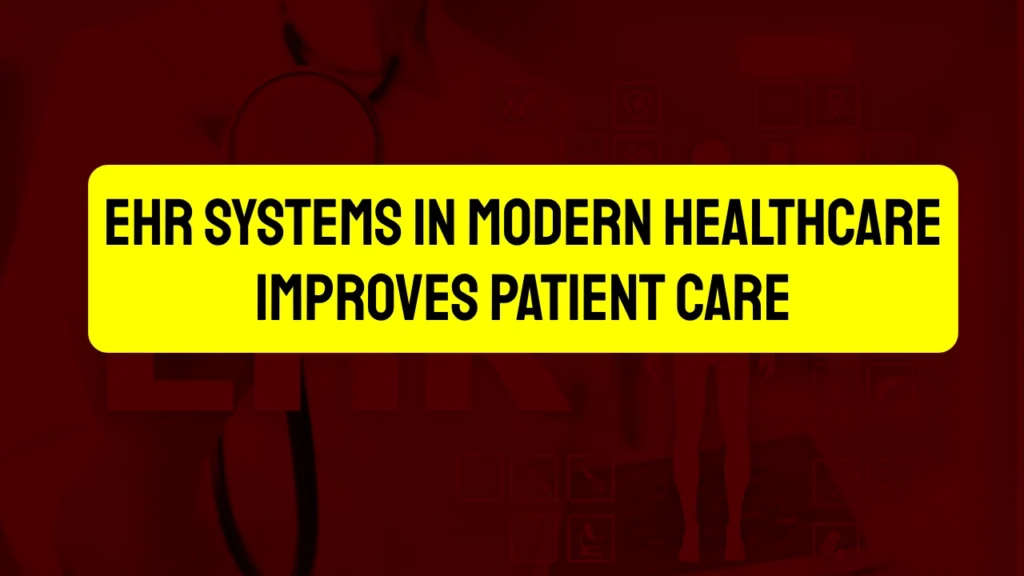Home » EHR Systems in Modern Healthcare Improves Patient Care
EHR Systems in Modern Healthcare Improves Patient Care
- BLOGGED BY SIRAS KHAN P (Content Writer) -
- Aug 28 2024 -
- 06 MINS READ

Table of Contents
EHR Systems in Modern Healthcare Improves Patient Care
Electronic Health Record (EHR) systems have become essential tools for enhancing patient care and streamlining medical processes in modern healthcare practice. The shift from paper-based records to Electronic Health Record (EHR) systems marks a significant evolution in the healthcare industry.
EHR systems are digital versions of patients’ medical records and contain all the information, from medical history and diagnoses to treatment plans and billing details. This digital shift is reshaping how healthcare providers manage patient information, leading to better patient outcomes that shine with productivity and improved data security.
Key Benefits of EHR Systems
1. Improved Patient Outcomes
EHR systems play a critical role in improving patient care by providing healthcare providers with instant access to accurate and up-to-date patient information. This access enables doctors to make well-informed decisions, leading to more accurate diagnoses and better treatment plans.
Additionally, EHR systems support remote monitoring and telehealth services, allowing patients to receive timely care and reducing the risk of complications.
2. Efficient Management of Clinical Records
Managing clinical records is a complex task, but EHR systems simplify this process by automating data entry and organising information logically. These systems can store vast amounts of data, including patient history, treatment notes, and financial records.
The automation capabilities of EHR systems help eliminate errors, streamline workflows, and support timely decision-making in critical situations.
3. Simplification of Patient Medical Processes
From scheduling appointments to discharging patients, EHR systems simplify every aspect of the patient’s journey. Patients can book appointments online, healthcare providers can access patient records instantly, and medication reminders can be automated.
The entire process, from admission to discharge, becomes more efficient, leading to higher patient satisfaction and better healthcare outcomes.
4. Making Sure There is Compliance with Healthcare Codes
EHR systems ensure that healthcare organisations comply with various coding and regulatory standards. By automating the coding process, these systems reduce the risk of errors and help healthcare providers avoid legal penalties.
Accurate coding also speeds up the reimbursement process, ensuring that healthcare providers receive timely payments and maintain financial stability.
5. Improving Data Security
The security of patient data is a top priority in healthcare. EHR systems are designed to protect sensitive information from unauthorised access and cyber threats. With advanced encryption methods and strict access controls, EHR systems safeguard patient privacy and ensure compliance with data protection regulations. This protection is crucial to maintaining patient trust and preventing data breaches.
6. Improved Healthcare Productivity
EHR systems significantly boost productivity by streamlining administrative and operational tasks. By automating routine tasks, such as billing and data entry, healthcare providers can focus more on patient care.
The integration of EHR systems with other healthcare technologies, such as pathology lab software and pharmacy information systems, further enhances efficiency and reduces the burden on healthcare staff.
Why EHR Systems Are Essential for Modern Healthcare
EHR systems are not just about digitising patient records; they are about transforming healthcare delivery. By providing real-time access to patient data, reducing errors, and improving communication among healthcare providers, EHR systems enhance the overall quality of care.
They also play a crucial role in modern healthcare by supporting data-driven decision-making, improving patient safety, and facilitating better outcomes.
Conclusion
The adoption of EHR systems is no longer a luxury but a necessity in modern healthcare. These systems offer numerous benefits, from improving patient outcomes and streamlining clinical processes to enhancing data security and ensuring compliance with healthcare regulations.
At Anton’s MediCode, we understand the critical role EHR systems play in healthcare and offer the right training programs to help professionals master this essential technology.
Contact us today to learn more about our courses and how you can become proficient in using EHR systems.
Join the Best Medical Scribing Course in Kerala at Anton’s MediCode and get a successful career in Hospital Medical Scribing .
Our Courses
- Medical Coding
- Medical Transcription
- Medical Scribing
- Hospital Administration
- Antonsmedicode
- No #1 Medical Coding And Scribing Institute In Kerala
